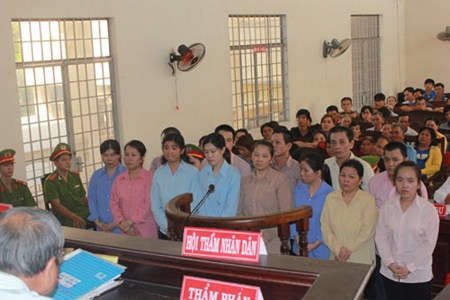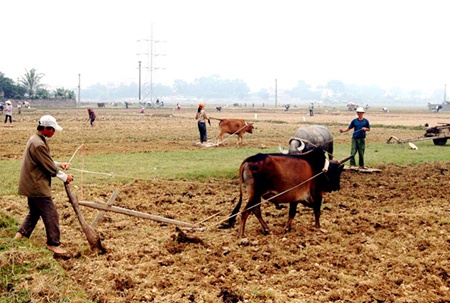Social Headlines December 7 Southern province's court jails women trafficking ring  The People's Court of southern The longest sentence, 10 years in jail, was given to Nguyen Thi Ngoc Hien, a 37-year-old woman from The indictment by the provincial People's Procuracy said four people from the trafficking ring were arrested at The two men accompanying these two women, Ye Yong Fu and Cheng Xiang Sheng, both 36, were identified as those paying to take the women to As local police expanded their investigation, they arrested the remaining members of the ring. The group had sold 56 Vietnamese women, mostly from southern Four poisoned by alcohol in Quang Ninh Four people in the northern The victims had drunk the alcohol, labeled as made-of-sticky-rice alcohol produced by the Ha Noi 29 Import Export JSC, said director of The wine was said to have been part of an October 12 batch. Province authorities later tested samples of the alcohol and discovered that its methanol content exceeded the allowed limit by 2,000 times. Local authorities have confiscated all alcohol products made on October 12 for further investigation. Remains of US servicemen repatriated  A repatriation ceremony of the remains of US servicemen who died during the Vietnam War was held at Present at the ceremony included representatives from the Board of Directors of Vietnam Office for Seeking Missing Personnel (VNOSMP) and the Consulate General of the The Vietnamese representatives handed over to the The remain had been jointly reviewed and concluded by Vietnamese and US forensic specialists that they might be related to the US servicemen missing during the Vietnam war and were recommended to be brought to Hawaii island, the US, for further review. US Government representative spoke highly of the humanitarian policy, goodwill and effective cooperation of the Vietnamese Government and people. The search for the remains of This is the 129th hand-over of remains of US servicemen since 1973. The German Society for International Cooperation (GIZ) and the Ministry of Agriculture and Rural Development (MARD) met in The meeting marked the three-year project’s successful completion. It was instigated to develop the staffing, institutional, technical, financial, and legal support necessary for preserving biodiversity in Vietnamese forest ecosystems. The meeting heard the project established legal and policy frameworks, financing mechanisms, and encouraged more effective coordination and cooperation. In doing so, it helped the MARD devise a national capacity development plan for the Vietnam Protected Areas system. The project also investigated alternative non-State financing, worked to improve the efficient deployment of public funds, and elevated both institutional and individual expertise in biodiversity conservation and protected areas management. Meeting attendees said the lessons learnt during the project will provide the initial springboard for a new January 2014 GIZ cooperation programme focusing on forest conservation and the sustainable use of forest resources. Laos, Visiting Vietnamese Minister of Education and Training Pham Vu Luan and his Lao counterpart Phankham Viphavan made the commitment during talks in In 2014, the two ministries will work with their respective agencies to follow through on all existing agreements. These include a project to improve the quality and efficiency of Vietnam-Laos cooperation in education and human resources development over the 2011–2020 period; a protocol on personnel training cooperation; and an annual agreement on economic, cultural, educational, scientific, and technological cooperation. Both host and guest noted delight at the bilateral relationship’s fruitful development, citing their regular delegation exchanges and sharing of experience. Statistics from September 2013 indicate As Council Chairman of the Southeast Asian Ministers of Education Organisation (SEAMEO), Minister Luan held a working session with its Lao members. The session acknowledged the SEAMEO’s 16 successful training courses between 1998 and 2013, improving the leadership and management skills of educators working at high schools, colleges, and universities in International Volunteer Day marked in Vietnam A series of activities have been held in They include a photograph exhibition on Australian volunteers working in Deputy Ambassador Phillip Stonehouse said the embassy honours the volunteers’ important contributions to reducing poverty in the community, maintaining sustainable growth in Since the two countries established diplomatic ties in 1973, more than 1,000 Australian volunteers have been working in Since 1960, UNICEF raises funds for Vietnamese children The United Nations Children’s Fund (UNICEF) raised US$435,000 at a Zero Awards ceremony in The charity fundraising, the first of its kind held in Statistics show in Vietnam three million children do not have access to clean water and one child dies every hour due mainly to drowning or traffic accidents. At the event, artworks, a football T-shirt signed by Manchester United players, NYC fashion week and Justin Timberlake’s concert tickets were put for auction. UNICEF plans to allocate proceeds from the auction to healthcare, nutrition and water supply programmes for children, as well as a vulnerable children protection programme in the Central Highlands UNICEF also honoured individuals and organisations that have actively joined charity campaigns for children. With UNICEF assistance over the past 30 years, Farmers face difficulties in modern times  The statement was made by the head of the Viet Nam Farmers Association, Nguyen Quoc Cuong, at a workshop on the role of Vietnamese farmers, held by "When the country suffers economic downturns, farmers usually play an important role to help keep its economy stable, but that role has become less crucial," Cuong said. Farmers were the largest in numbers, compared with other classes in the country, and contributed the most to the country, while benefiting the least, he added. Addressing the workshop, Assoc Prof. Bui Quang Dung from the Viet Nam Academy of Social Sciences, said the country has, over the past 30 years, seen quick development in agriculture. The material and spiritual lives of farmers has improved, while the number of poor families has been remarkably reduced. In addition, the average income per capita of farmers in 2010 increased by 52.8 per cent, in comparison with 2008. "However, such achievements are still not on par with the country's potential in agriculture", Dung stressed. Expressing his sympathy for farmers' difficulties, Professor Nguyen Lan Dung said that farmers now have enough food to eat, but do not have enough money. "I have traveled to many rural areas, and numerous farmers told me that each earned only VND2,000 (US$0.1) per day", Dung said. Nevertheless, there are currently many shortcomings in policies which made farmers' lives harder, he added. Dung cited that in the poor Quang Xuong Commune of northern It costs too much to pay for these cadres every month, but they, in fact, can not help farmers in alleviating poverty. To deal with the issue, Dung suggested applying technology and science in agricultural production, because professional farmers were a key to success. Sharing the same opinion, former Deputy Minister of Agriculture and Rural Development Ho Xuan Hung said that farmers should be taught about agricultural equipment usage, agricultural production processes and, especially, knowledge about consuming. "I was very sad to know that many foreigners said Vietnamese farmers were unprofessional", he said. According to Hoang Xuan Thanh, an expert from Oxfam, education for farmers and local authorities should receive more attention to ensure the reduction in poverty continues. Community connections should also be fostered to help farmers eliminate poverty in the most effective way. During the seminar, the The country should also create improved conditions for farmers to have access to credit and social security, it said. Ha Noi reaches GRDP goals Ha Noi has reached all key targets set for 2013, with higher economic growth and better social protection, according to Nguyen The Thao, chairman of the Ha Noi People's Committee. Thao made the statement yesterday at a meeting with the Ha Noi People's Council to review the capital city's performance in 2013. He said the Gross Regional Domestic Product (GRDP) of the city had grown each quarter, with the figure increasing from 7.46 per cent in the first quarter to an expected 9.05 per cent in the fourth quarter. This means the estimated average GRDP of the entire year might reach 8.25 per cent, an increase of 0.19 per cent against last year and far surpassing the average growth of the entire country. Another achievement highlighted by Thao was that the city had managed to improve its control of inflation, with the consumer price index (CPI) for the entire year estimated at 7.6 per cent, compared to 8.57 per cent in 2012. In addition, Ha Noi has worked to ensure social protection, as it has created jobs for over 136,500 citizens and supported 16,500 households to help them escape poverty. Regarding the tasks for next year, Thao said there are five main targets. The first, and also the most prioritised task, is to overcome economic difficulties to focus on business development and achieve higher and more sustainable growth. The second is to improve the investment environment, the third to ensure social protection, security and social welfare, and the fourth to enhance governance in land management, construction, transport and environment. The last is to continue developing administration reforms and fighting waste and corruption. Thao said that the first mission for the People's Committee in 2014 is to focus on setting targets and plans for next year for underlying sectors and ensuring the supply of goods and social security during the Lunar New Year. Earlier on Thursday, the Ha Noi People's Council also held a question and answer session in which delegates posed questions to the city's leaders to find solutions to existing problems in land management and food safety. In response to a delegate's question about increasing cases of land violations, Vu Hong Khanh, vice chairman of the council, said during recent years the city had paid much attention to the problem and made some positive changes. Yet, he noted that at local levels, the authorities had not ensured strict management and allowing violations to occur. He said the city had sent inspection groups to local areas with serious violations to investigate and impose strict punishments. During the past year, out of 261 cases of land encroachment over public land and agricultural land throughout the city, 201 cases had been dealt with, while local authorities continue working to resolve the remaining cases, said Khanh. In response to a delegate's questions about the progress of developing organic vegetables, Tran Xuan Viet, vice chairman of the Ha Noi People's Committee, said the city had 85 stores, 76 distribution locations and 40 super markets selling organic vegetables. He added that businesses violating food safety regulations had also been made public, to warn citizens. Ngo Thi Doan Thanh, chairman of the city People's Council, said all sectors, especially agriculture, health and trade, should now consider ensuring food safety a high priority. A Vietnamese delegation, led by Deputy Minister of Agriculture and Rural Development Le Quoc Doanh, attended the Conference on Agriculture, Food and Nutrition Security and Climate Change (AFC) in The event, which took place December 3-5, was organised by the Governments of South Africa and the The first AFC was held in Delta applies technology to rice cultivation Cuu Long (Mekong) Delta, the country's rice granary, plans to stabilise rice production at around 24 million tonnes a year for the next two decades (until 2030), according to the Cuu Long Delta Rice Research Institute. Several research institutes have been co-operating with all the delta provinces as well as Can Tho City in projects that apply advanced technology to create new rice varieties and also recover indigenous rice varieties that are suited to local climatic conditions, are disease resistant and of high quality and high yield. In the short term, the delta will give priority to creating hybrid rice varieties that can be grown in tough conditions like floods, drought, saline intrusion and other climate change impacts. After 2015, the delta will further develop rice cultivation under the national and international Good Agriculture Practices (GAP) standards. The target is to ensure that such production will take place on at least 40 per cent of the delta's rice cultivation area. The region will also develop rice processing technology so as to produce high-value products and reduce dependency on raw rice exports. This will create more jobs and increase the value of locally grown rice. Rice production in the delta has increased from 4.2 million tonnes of paddy in 1976 to 24.5 million tonnes of paddy last year. Quality assurance offered on smaller scale As demand for safe vegetables intensifies, international certifications and even Vietnamese Good Agricultural Practices (VietGAP) certification remain too expensive for small-scale farmers. At a recent conference in Ha Noi, experts touted the benefits of the Participatory Guarantee System (PGS), a community-based monitoring system that offers a more affordable means of quality assurance. While the average cost for VietGAP certification ranges from VND20-45 million (US$940-2,115) for 24 months, and it is only suitable for large-scale producers, the PGS model only requires 440-500sq.m and costs between VND250,000 ($12) and VND350,000 ($17) per household per year, "My income since applying PGS is VND3-5 million ($142-237), double what it was before," said Tran Thi Ha, a farmer from northern Phu Tho Province's However, Dao The Anh, Director of Centre for Agrarian Systems Research and Development (CASRAD) cautionary noted, "because the system has been promoted only by a few foreign development agencies, barely 5 per cent of consumers know about it." PGS has been applied in the Speakers at the conference said that the community-based monitoring system should be expanded and more consumers should be informed about how it works. PGS was first introduced in 2004 by the International Foundation for Organic Agriculture (IFOAM), and the Latin American Agroecology Movement (MAELA). Saigon Co.op yesterday awarded 85 scholarships worth VND5 million each to poor students with outstanding academic records at universities nationwide. In the last five years, more than 400 poor students in 38 cities and provinces have benefited from the programme, which has given scholarships worth a total of VND3 billion ($141,810). Scholarship winners have also been given the opportunity to work part-time at Saigon Co.op's units. Corporate responsibility needs a boost Vietnamese enterprises had failed to implement effective corporate social responsibility projects in a strategic way to create long-term social benefits and improve their reputations, a study revealed yesterday. The study was jointly conducted by the Centre for Community Support and Development Studies (CECODES), the Asia Foundation and the Vietnam Chamber of Commerce and Industry (VCCI). Of the 516 Vietnamese enterprises surveyed in Ha Noi, Da Nang and HCM City last year, more than 390 understood their social responsibility and had invested VND113 billion ($5.3 million) and 19,500 man hours. However, for many, giving is an ad-hoc, short-term activity. Dang Hoang Giang of the CECODES said that in western countries, corporate responsibility was a way to bolster the reputation of enterprises, but this thinking seemed to be absent among Vietnamese firms. "Giving is not considered a part of business," Giang said. "Many enterprises do it randomly, such as supporting flood victims or distributing New Year's gifts to the poor." He cited the HCM City-based Hoa Sen Group as an example. In May, the group brought Nick Vicijic, an Australian disabled motivational speaker, to Many activities were also half-hearted, he said. According to the study, only 15 per cent of enterprises conducted social responsibility projects to enhance their reputation and image, while the rest said they had no business agenda. They also failed to evaluate the results of their contributions, and as a result, few had sustainable plans in place. One third of the enterprises surveyed did not have corporate responsibility plans for next year. According to Giang, non-governmental organizations (NGOs) should work with enterprises to plan and implement strategic corporate responsibility initiatives. However, only 9 per cent of businesses said they had co-operated with NGOs because they were unsure of their roles or trustworthiness. Pham Chi Lan, former vice chairwoman of the VCCI said the practice of giving among enterprises was unpopular because some doubted their cash would reach those it was intended for. Others, worried about the media and public opinion, wanted their contributions to remain anonymous. She said to boost social responsibility efforts the State should form a policy to incorporate it into business activities. Reports on corporate social responsibility should also be made available to help connect enterprises and those who need help. UNICEF raises more than $400,000 for ZEROawards programme The UNICEF ZEROawards gala held on Thursday (Dec 5) in The ZEROawards is an initiative of Believe in ZERO, a global UNICEF campaign launched in An estimated $250,000 of the funds will be donated to programmes in central The remaining funds will be used to support children in one of the seven other provinces where UNICEF works. The highlight of the gala, ZEROawards, went to three recipients who were recognised for their humanitarian efforts to fulfill children's rights and reduce the number of vulnerable children to zero. The UNICEF ZEROawards 2013 award for Exceptional Commitment went to the Blue Dragon Children's Foundation and the award for Special Achievement for Children's Rights was presented to the Da Nang Association for Victims of Agent Orange. The award for Social Innovation went to KOTO, a not-for-profit social enterprise. Under its Believe in ZERO programme, UNICEF aims to reduce the number of preventable child deaths to zero, the number of exploited or abused children to zero, and the number of children deprived of clean water or denied access to school to zero. "For the first time in the history of UNICEF in Attending the fundraiser gala were officials from the Government, respected members of the business and private philanthropist community from UNICEF offers support from early childhood through adolescence for children in more than 190 countries and territories. Source: VNS/VNA/VOV |
↧
Article 2
↧